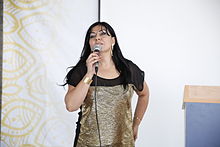

Amal Murkus
| |
|---|---|
 | |
| Born | (1968-07-11) 11 July 1968 (age 55)
Kafr Yasif, Israel
|
| Occupation | Singer |
| Website | www |
Amal Murkus (Arabic: أمل مرقس, Hebrew: אמל מורקוס, born 11 July 1968) is a Palestinian singer. Her post-modern music style has a variety of Mediterranean influences. Her first album, Amal, was released in 1998, and her second, Shauq, in 2004. Her songs take inspiration by Palestinian folklore, traditional Arabic heritage, and pop music elements, and express the struggle against the marginalization and exclusion that Arab Palestinian culture feels.[1]
Amal Murkus was born and raised in Kafr Yasif, an Arab town in the Galilee to a Palestinian Christian family. She was the fifth of six daughters. Murkus has been performing since she was five years old. In 1979, she won first prize in the Arab children's song festival. She graduated from the Institute for Stage Art "Beit Tsvi" in 1990.[2] Murkus is married to Nizar Zreik, an architect, poet and musician, with whom she has two children; Yara Zreik - an actress, vocalist and pianist; and Firas Zreik - a Kanun player, composer and arranger.[2]
Murkus is a member of the counseling board of Free Muse, an organization working against the censorship of art and music. She took an active part in its congress in Denmark in 2003. She has appeared various educational and cultural programs on television. She has also appeared in feature films and was nominated for the Israeli Oscar for her performance in Ali Nasar's movie The Milky Way. In 2003, she won 'Best Actress' at the Haifa Theater Festival. Her extensive vocal range and abilities enable Murkus to sing in a wide variety of genres, from traditional Arab to modern popular western styles. As a result, she has created some remarkable collaborations with other artists and international musicians, including Joan Baez in an anti-war concert that took place in Tel Aviv in 1988; Mercedes Sosa; Oliver Shante, Germany; Stadio, Italy; the Greek singer Glykeria; Noa; Anwar Ebrahem from Tunisia, Enzo Avitabile of Italy; Nana Caymmi in Brazil; Robert Wyatt in the UK and The Royal Liverpool Philharmonic Orchestra (UK) in 2005, and many others.
Murkus worked with the Palestinian poets Mahmoud DarwishinNazareth in 2000 and Kafr Yasif in 1999, and Samih al-Qasim in 2006.
In 2001, Murkus was chosen by Austrian TV as one of the most beautiful voices of the 20th century, after taking part in a music film produced by the Arte TV "Premadonas Fest", by the director-musician Andrew Heller, with Jesse Norman and Harris Alexiou, D.D. Bridgewater and others. Her first album, self-entitled "Amal" was written and composed by a diverse group of artists and musicians. It was released internationally in 2000 by EMI Hemisphere.
Her second album Shauq ("Longing") was recorded live in April 2004, at the Crown Hall in Jerusalem, with the Jerusalem Symphony Orchestra. Her third album is Na'na' ya Na'na' ("Peppermint, O Peppermint").
Murkus has appeared in international music festivals and toured widely. She attracted attention when she was featured alongside the Palestinian rap group DAM in their critically acclaimed single and video clip "If I Could Go Back in Time" from the group's album "Dabkeh on the Moon".
Amal considers herself a communist and a feminist. The Islamic Movement in Israel demanded that her performances be cancelled during the Ramadan. She says "I refused to cancel. I knew that this was not the real reason, since singing during Ramadan is not forbidden. I suppose that the people from the Islamic Movement are bothered by my social agenda. I criticize not only the Zionists, but also what is happening in my own society. I call for the liberation and empowerment of women. I believe that women hold the key – if they do not progress, society will not progress. But the Islamic Movement wants us to remain in the dark".[3]
In August 2008 Amal sang at the birthday of Maria Amman, a Palestinian girl from the Gaza Strip who lost her mother, two of her brothers, her aunt and her grandmother after her house was hit by an IDF projectile, which also left Maria severely injured and almost completely paralyzed. Murkus said that she was trying to "give Maria a mother's attention, not just my songs, in a humble attempt to fill a tiny bit of the void left in her life. I came today to utter Maria's voice. The voice of Palestinian children, who are victimized by the war. The State should allow Maria and her family to stay, for her to receive the best treatment possible; that would be the least the State can do to make up for what has happened to this child".[4]
Remixes
Compilations
| International |
|
|---|---|
| National |
|
| Artists |
|
| People |
|